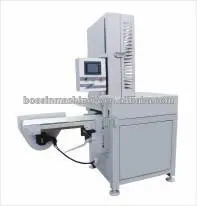
dec . 10, 2024 20:31 Back to list
Meat Separator Pricing Guide for Efficient Processing Solutions
Understanding Meat Separator Price Lists A Comprehensive Guide
In the meat processing industry, efficiency and precision are paramount. Among the various pieces of equipment used, meat separators play a crucial role in optimizing production processes. Understanding the price lists for meat separators can provide valuable insights for businesses looking to invest in such equipment. This article will delve into the factors influencing the pricing of meat separators, different types available in the market, and tips for making an informed purchasing decision.
What is a Meat Separator?
A meat separator, commonly referred to as a meat deboner or meat bone separator, is a machine designed to maximize meat extraction from bones. It utilizes advanced technology to separate meat fibers from bones, minimizing waste and ensuring maximum yield. This equipment is essential for both large-scale meat processing facilities and smaller butcher shops, as it helps in producing various meat products, including ground meat, sausages, and other processed meats.
Factors Influencing Pricing
Several factors influence the pricing of meat separators, including
1. Type of Separator There are primarily two types of meat separators batch and continuous. Batch separators are typically less expensive and suitable for smaller operations, while continuous separators, designed for higher throughput, tend to be more costly.
2. Capacity The capacity of the meat separator plays a significant role in its price. Higher capacity machines capable of processing large volumes of meat in shorter times often come with a higher price tag.
3. Technology Advanced machines equipped with features such as automated processing, enhanced safety measures, and superior separation efficiency usually command higher prices. Investing in technology can lead to long-term savings through increased efficiency.
4. Material and Build Quality Separators made from high-quality stainless steel and designed for durability will typically be priced higher due to their longevity and resistance to corrosion.
5. Brand Reputation Established brands with a reputation for quality and reliability often charge premium prices. However, these brands typically offer better warranties and customer service, which can be beneficial for businesses in the long run.
6. Additional Features Some separators come with added features like variable speed control, easy-clean designs, or integrated cooling systems. These additional functionalities can raise the machine's cost.
meat separator pricelist

Typical Price Ranges
On average, the price of meat separators can vary widely. Smaller batch machines can start as low as $5,000, while larger, high-capacity continuous separators may exceed $100,000. Most mid-range machines fall between $20,000 to $70,000, depending on the factors mentioned.
Making an Informed Decision
When considering an investment in a meat separator, it's crucial to evaluate your specific needs. Here are some tips for making an informed purchase
1. Assess Your Needs Consider the volume of meat you process, the level of automation you desire, and the type of products you plan to produce.
2. Research Brands and Models Look for reputable manufacturers with positive reviews from other users. It's often beneficial to consult industry peers for recommendations.
3. Evaluate Total Cost of Ownership Consider not just the initial purchase price, but also maintenance costs, energy consumption, and potential downtime.
4. Request Demonstrations If possible, arrange for demonstrations to see the machines in action. This can provide insight into their efficiency and ease of use.
5. Consider Financing Options Many suppliers offer financing plans that can make large purchases more manageable for small businesses.
Conclusion
Understanding meat separator price lists is essential for any business involved in meat processing. By considering various factors such as type, capacity, and features, businesses can find a machine that meets their needs and fits within their budget. With the right investment in a meat separator, companies can enhance their operational efficiency, reduce waste, and ultimately increase profitability.
Latest news
-
Great Wall DKJC Series Auto Sausage Clipper: Efficient & Durable
NewsJul.25,2025
-
Pneumatic Clipping Machine: Efficient and Reliable Solution for Industrial Applications|Precision Cutting, Durability
NewsJul.21,2025
-
Pneumatic Clipping Machine - Shijiazhuang Bossin Machinery Equipment Co., Ltd.
NewsJul.21,2025
-
Pneumatic Clipping Machine - Shijiazhuang Bossin Machinery Equipment Co., Ltd.
NewsJul.21,2025
-
Pneumatic Clipping Machine - Shijiazhuang Bossin Machinery Equipment Co., Ltd.
NewsJul.21,2025
-
Pneumatic Clipping Machine - Shijiazhuang Bossin Machinery | Precision Cutting, High-Speed Operations
NewsJul.21,2025